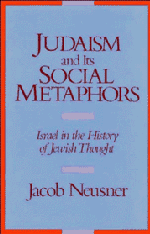Book contents
- Frontmatter
- Contents
- Preface
- List of Abbreviations
- Introduction
- 1 Imagining Society, Re-visioning “Israel”
- PART I “Israel” in the First Statement of Judaism, 70–300 C.E.
- PART II “Israel” in the Second Statement of Judaism, 300–600 C.E.
- 6 “Israel” on Its Own Terms
- 7 “Israel” as Family
- 8 “Israel” as Family and Also Singular Nation
- 9 “Israel” as Sui Generis
- 10 The Second Phase of the Judaism of the Dual Torah and Its Social Metaphors
- PART III Same Metaphors, Other Systems
- General Index
- Index to Biblical and Talmudic References
8 - “Israel” as Family and Also Singular Nation
Published online by Cambridge University Press: 04 August 2010
- Frontmatter
- Contents
- Preface
- List of Abbreviations
- Introduction
- 1 Imagining Society, Re-visioning “Israel”
- PART I “Israel” in the First Statement of Judaism, 70–300 C.E.
- PART II “Israel” in the Second Statement of Judaism, 300–600 C.E.
- 6 “Israel” on Its Own Terms
- 7 “Israel” as Family
- 8 “Israel” as Family and Also Singular Nation
- 9 “Israel” as Sui Generis
- 10 The Second Phase of the Judaism of the Dual Torah and Its Social Metaphors
- PART III Same Metaphors, Other Systems
- General Index
- Index to Biblical and Talmudic References
Summary
Mixing Metaphors
The metaphor of the family hardly exhausted the choices facing the fourth-century sages in the Land of Israel. “Israel” stood for not only family among families, but also people or nation among entities of the same genus. Long before the advent of Christianity, Jews, quite naturally thinking of themselves within the biblical record as embodying, now, the people Scripture had called “Israel,” of course had attained consciousness of their singularity among the peoples or nations of the world. In the debate with Christianity sages evoked not only “family” but also “nation,” or “people,”'an altogether political entity. In framing the metaphor of a social entity like, yet not alike, all other social entities – hence a nation, but a singular nation – sages prepared for their adversaries yet a second point-by-point reply to a critical challenge, one closely related to but distinct from the metaphor deriving from the family. The reason sages required this second metaphor – nation unlike other nations – is that, for their part, the Christians spoke in political, as well as genealogical, terms. They too invoked in explaining the social entity constituted by them the metaphor of people or nation, one of a peculiar order to be sure. Consequently, the polemical task directed attention to the metaphor built not upon genealogy but upon a different sort of polity.
The Family-Nation and the Confrontation with Christianity
The Christians from the beginning saw themselves as a people without a past, a no-people, a people gathered from the peoples.
- Type
- Chapter
- Information
- Judaism and its Social MetaphorsIsrael in the History of Jewish Thought, pp. 145 - 163Publisher: Cambridge University PressPrint publication year: 1989



